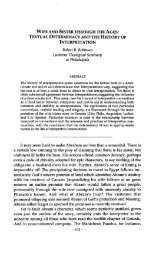FROM EXEGESIS TO HERMENEUTICS - Rice School of Pastoral ...
FROM EXEGESIS TO HERMENEUTICS - Rice School of Pastoral ...
FROM EXEGESIS TO HERMENEUTICS - Rice School of Pastoral ...
You also want an ePaper? Increase the reach of your titles
YUMPU automatically turns print PDFs into web optimized ePapers that Google loves.
Schneiders: From Exegesis to Hermeneutics 37respond to God's call <strong>of</strong> Christ's members to peace? 51 If we try to getbiblical texts to supply straightforward answers to modern questionsrather than trying to dialogue from the standpoint <strong>of</strong> our questions withthe text about its questions, we vitiate the hermeneutical process. Wemust engage the text's questions so as to illuminate our world with itsinsights and allow our new questions about the same subject matter toextract from the text the riches which are grounded in the author'sintention but which can only emerge in a later event <strong>of</strong> meaning.As Catholics we can recall that this approach is not entirely new.Patristic, and especially medieval exegesis with its interpretive theory <strong>of</strong>the plurality <strong>of</strong> levels <strong>of</strong> meaning in the text, were quite sensitive to thevery problem Gadamer raises. 52 However, the medievale did not have thesame scientific capacity to recover the original meaning <strong>of</strong> the text thatwe do. While we need tò reappropriate their sense <strong>of</strong> the nature <strong>of</strong> thebiblical text as many-leveled religious literature and their concern forthe truth claims <strong>of</strong> the inspired text we must also continue to wrestlewith the tension they did not experience between what the text meantand what the text means. An exclusively historical critical approach thatis one-sidedly concerned with the former is sterile. But an exclusive anduncritical concern with the latter will result in fundamentalism or uninformedpietism. The task <strong>of</strong> our own time is to appreciate and exploit thecreative possibilities <strong>of</strong> the tension between what the text meant andwhat the text means.In summary then, our third model, the hermeneutical model, isbased on a new understanding <strong>of</strong> the text as written work and a newunderstanding <strong>of</strong> the act <strong>of</strong> interpretation as a fusion <strong>of</strong> our own horizonwith that <strong>of</strong> the text on the basis <strong>of</strong> a shared tradition <strong>of</strong> concerns. Theultimate object <strong>of</strong> the biblical research, in other words, is precisely thecontemporary meaning <strong>of</strong> the text.HI. Implications <strong>of</strong> the Three Models for the Question <strong>of</strong><strong>Pastoral</strong> Use <strong>of</strong> the Results <strong>of</strong> Biblical ResearchIn this final section I would like to suggest that the answers to thequestions <strong>of</strong> whether biblical research is a practical or speculative disciplineand whether biblical data is pastoral or theoretical is that it alldepends on what model <strong>of</strong> biblical interpretation one is using.If one is working within the pro<strong>of</strong>-text model then biblical researchis eminently practical. Its task is to find texts to support either speculativetheological positions or pastoral prescriptions. The texts themselvesare presented as theoretical or practical depending on the context in51 See Donahue, "Divorce: New Testament Perspectives."52 See Steinmetz, "The Superiority <strong>of</strong> Pre-Critical Exegesis." I am grateful to RaymondBrown whose helpful reflection on this section <strong>of</strong> the paper led me to formulate thisxParagraph.



